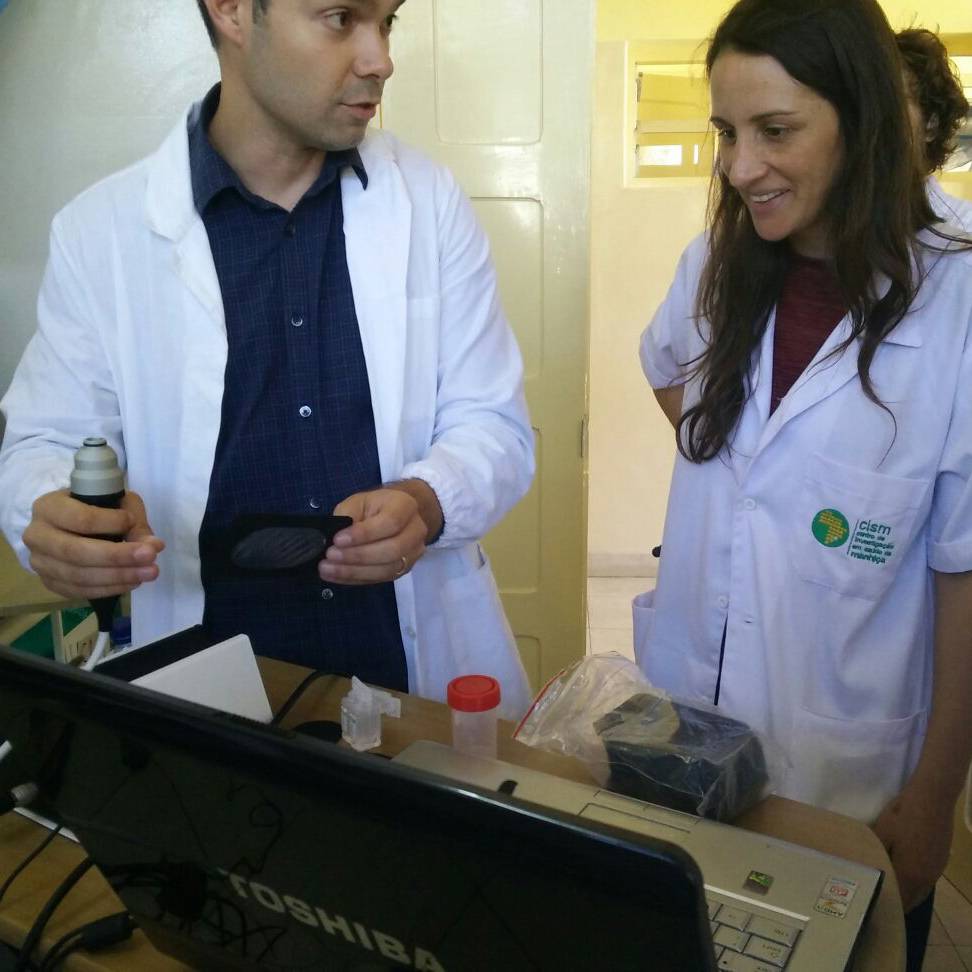
Behind the idea is Xavier Jiménez, engineer and doctor in biomedical engineering, who until now has been the main driving force behind Neosonic, a non-invasive device for the detection and prevention of meningitis in children. This illness, he points out, "is difficult to detect, because one of its main symptoms is fever, which can be caused by just about any disorder."
Doing a lumbar puncture on a child, "is a very invasive method," but the only way of detecting the disease so that the patient can receive hospital treatment. While it is an aggressive system, he recognises that a great many tests are carried out in our society and that 95% prove negative, the opposite of what happens in the Third World: "There, there is a lot of meningitis, but they do not have laboratories to analyse the liquid sample extracted from a lumbar puncture. And often the children in these areas with endemic malaria are treated with anti-malaria medication, when in fact they have meningitis and so they end up dying because without anyone realising it they do not get the medication they need." It is estimated that almost 170 children a day die from meningitis in developing countries, a figure that could be drastically reduced with real-time analysis of the liquid sample with the use of this device.
Born to boost the biomedicine sector
The base for New Born Solutions is in Madrid through a consortium of the Madrid community and the Massachusetts Institute of Technology (MIT). "They selected me from an international panel to enter this programme created to identify projects to boost the biomedicine industry of the Community," he says about the beginnings of the project.
The research took three years and led to cooperation between Boston and Madrid that later led to setting up the company in November 2015. But among the contacts they made was with a Danish company, which they worked alongside to develop the prototype. Although the company is located in the Spanish capital – due to its link with MIT through the consortium- the startup's activities are in Barcelona.
 |
| Neosonic can detect the disease quickly to speed up the process of hospitalisation. Ceded |
Search for excellence to attract funding
Since the company was set up, the team –made up of Jiménez as CEO and Pablo García as financial director- has been working on a business plan. "One of the consequences of this work was joining the acceleration programme Imagine If! and winning a place in the final in Cambridge," he says. The international programme organised for the first time in Barcelona by IQS Tech Factory, aims to boost entrepreneurial projects with a scientific basis that can have a positive impact on health.
Until now, the prize obtained from the MadridD foundation in being chosen as the best technologically based idea and their own funding, have served to bring in the necessary capital and cover operation costs. They now want to open a new line of funding for Neotec, a public subsidy to cover 70% of the company's budget, while the firm finds the remaining 30%. "The idea of putting ourselves forward for Imagine IF was to keep this option open," he says. "If we win in Cambridge, it could bring us in 30,000 dollars and visibility and contacts with investors there, so that we will be able to get this 30%."
A long-distance race
Whatever the funding method, Jiménez is convinced that the money will be found. "We believe that Neosonic will be available in hospitals in two years," he says, and he points out that working with a Danish company that is already established, with experience, and that is well-known in the sector is an added value: "They already have the technology developed, we merely make the modifications necessary for it to be adapted in a clinical context."
Moreover, he thinks setting a deadline of two years is not "going too fast" because "improvements can always be gradually introduced." "One of the main handicaps when you develop a medical tool is obtaining European certification for it to be adopted. We have already overcome that, because the agents with whom we work are already familiar with our technology and the certification process," he says.
In all, despite the aim to gradually internationalise the development of the hardware, they do not want to lose the cooperation with the Danish company. They also want to hold on to other agreements with the De la Paz, Quirón and Clínico San Carlos de Madrid hospitals and with the Institut de Salut Global in Barcelona (ISGlobal), among others. "Some help us in validating the prototype, others work with the liquid samples in the laboratory... each one contributes something and for us it is essential to reach medical centres as soon as possible," he says.